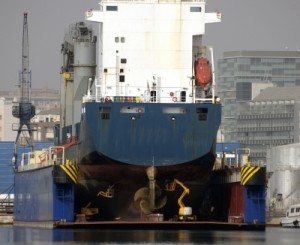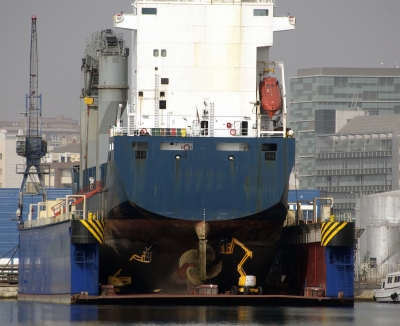 The newly signed Foreign Ships Co-loading Act will lower shipping costs and improve the country’s export competitiveness, according to the Association of International Shipping Lines (AISL).
The newly signed Foreign Ships Co-loading Act will lower shipping costs and improve the country’s export competitiveness, according to the Association of International Shipping Lines (AISL).
“Co-loading among foreign liners in transporting import and export cargo from one port to another port in Philippines will translate to a reduction in shipping costs and will help enhance the competitiveness of Philippine exports in the global market,” AISL general manager Atty. Maximino Cruz told PortCalls in an email.
Other stakeholders also hailed the siging of the law (go to page 5 for related story).
President Benigno Aquino III on July 21 signed Republic Act (R.A.) No. 10668, or “An Act Allowing Foreign Vessels to Transport and Co-load Foreign Cargoes for Domestic Transshipment and for Other Purposes.”
Cruz said co-loading among foreign vessels will eliminate costs usually incurred when domestic transshipment of import and export cargoes is performed by domestic carriers. These costs include hauling cost when transporting goods from international terminals such as Manila International Container Terminal or Manila South Harbor to domestic ports such as the Manila North Harbor; cargo handling charges paid by importer-manufacturers to the discharge and loading ports; and underguarding fees collected by the Bureau of Customs (BOC).
Before RA 10668 was signed, foreign cargoes bound for local ports carried by an international vessel had to be transhipped by a domestic vessel to the final port of destination as foreign vessels were prohibited from docking at multiple Philippine ports.
Other than higher cost incurred in the previous transport setup, Cruz added “the security and integrity of cargoes are put at greater risk whenever cargoes are transferred over land from the port of discharge to the loading port, not to mention the resulting inefficiency because of double handling.”
“The Co-loading Bill settles once and for all the right of international shipping lines to carry and transship empty foreign containers from one port to another port in the Philippines,” Cruz noted.
“For AISL, the passage of R.A. No. 10668 is an explicit recognition that empty containers are indeed part of the ships’ gear and their unhampered movement between ports should never be curtailed,” the AISL GM pointed out.
Cruz said he believes “a number of foreign lines will be interested to enter into co-loading arrangements in the transshipment of imports, exports, and empty foreign containers to and from Philippine ports.”
But he stressed that “whatever benefits the foreign lines can derive from the new law are merely collateral. The law is more for the benefit of local shippers/exporters,” he said.
Asked what routes will most likely be serviced by international lines as a consequence of R.A. 10668, Cruz said these could initially be Cebu, Subic, Batangas, Davao, General Santos, and Cagayan de Oro.
He stressed “that the law covers only imports and exports; carriage of domestic containers by foreign vessels is deemed to be in violation of the cabotage doctrine.”
Section 8 of R.A. 10668 states: “Foreign ships shall submit their cargo manifests to the Port Authorities to ensure that no domestic cargoes are carried by the foreign ship. No foreign vessel shall be allowed to carry any domestic cargo or domestic container van, whether loaded or empty, even if such domestic container van may container foreign cargo.”
Compromise law
The Philippine Liner Shipping Association (PLSA), the organization of domestic cargo carriers, noted that the law “is a compromise” that weighed the concerns of both domestic and foreign shipping lines. PLSA said only about 5% of containerized cargoes carried by local liners, which include transshipments and empty containers, will be affected. However, PLSA has not yet calculated the effect on non-containerized cargoes.
Philippine Inter-island Shipping Association (PISA), the umbrella organization of the country’s domestic maritime organizations, earlier said that though the bill helps lower costs for importers and exporters, it does not solve the high costs for domestic shippers.
PISA executive director Atty. Pedro Aguilar said the measure does not address the issue of high cost of domestic shipping, including one of its causes—the tax and duty on fuel levied on local shipping lines but not on foreign carriers. Aguilar said fuel accounts for up to 40% of local shipping costs.
Other factors raising domestic shipping costs include lack of economies of scale, lack of sufficient infrastructure, and duties and taxes imposed on local carriers that are not levied on foreign liners.
Under R.A. 10668, the BOC can fine or penalize any erring foreign ship operator under applicable provisions of the Tariff and Customs Code of the Philippines. The new law also effectively repeals Section 1009 of the TCCP.
The Department of Finance, BOC, Department of Trade and Industry, Bureau of Immigration, and port authorities are given 60 days to promulgate the implementing rules and regulations of R.A. 10668. – Roumina Pablo
Image courtesy of njaj at FreeDigitalPhotos.net





